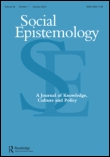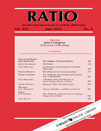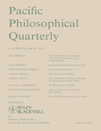
Social Epistemology
metrics 2024
Catalyzing interdisciplinary discussions on knowledge and truth.
Introduction
Social Epistemology is a premier journal, published by Routledge Journals, Taylor & Francis Ltd, that has been at the forefront of interdisciplinary discussions at the intersection of philosophy and social sciences since its inception in 1987. With an impressive trajectory marked by convergence until 2024, this journal occupies a distinguished position in academic research, evidenced by its Q1 ranking in Philosophy and Q2 ranking in Social Sciences, as well as its notable standing in Scopus rankings—placing it in the 91st percentile within the Arts and Humanities in Philosophy. Although it does not currently offer open access, Social Epistemology remains vital for scholars, professionals, and students eager to engage with complex issues surrounding knowledge, belief systems, and their societal implications. With an emphasis on fostering scholarly dialogue and advancing critical thought, this journal serves as an essential resource for those committed to understanding the nuances of epistemology in contemporary contexts.
Metrics 2024
 0.55
0.55 1.40
1.40 2.00
2.00 40
40Metrics History
Rank 2024
Scopus
IF (Web Of Science)
JCI (Web Of Science)
Quartile History
Similar Journals

MINERVA
Pioneering Insights for a Transformative TomorrowMINERVA is a prestigious academic journal published by Springer, renowned for its vital contributions to the fields of Education and Social Sciences. Established in 1962 and continuing its publication until 2024, MINERVA has established itself as a significant platform for scholarly discourse, offering high-quality, peer-reviewed articles that delve into contemporary issues and research in these disciplines. With an impressive impact factor and ranked within the Q1 category in both education and miscellaneous social sciences as of 2023, the journal stands out in the academic community, appealing to researchers, practitioners, and students alike. Since adopting an Open Access model in 2017, MINERVA enhances accessibility to its important findings, furthering academic engagement and collaboration. Its scholarly rigor is evident, as reflected in its rankings, including #52/604 in miscellaneous social sciences and #36/275 in general social sciences on Scopus. This journal is not only a repository of knowledge but also a catalyst for innovation and critical thought in today’s rapidly evolving educational and social landscapes.

European Journal for Philosophy of Science
Charting New Territories in Philosophy of ScienceThe European Journal for Philosophy of Science, published by SPRINGER, stands as a prestigious platform for scholars in the realms of philosophy and history of science. With an impressive impact factor and categorized in the Q1 Quartile for both History and Philosophy of Science and Philosophy, this journal ranks among the top 10% of its peers, reinforcing its critical role in advancing academic discussions and insights within these fields. With its composition of rigorous peer-reviewed articles and a commitment to fostering interdisciplinary dialogue, the journal navigates foundational and contemporary issues that shape scientific inquiry. Although currently not Open Access, it provides invaluable access to researchers, professionals, and students who seek to deepen their understanding of the philosophical underpinnings of scientific practice. Housed in the Netherlands, the journal continuously engages with the evolving landscape of philosophy in the scientific domain, making it a key resource for anyone invested in the intersection of science and philosophy.

Ratio
Fostering Intellectual Exchange for a Deeper UnderstandingRatio is a prestigious peer-reviewed journal published by WILEY, specializing in the field of Philosophy. Since its inception in 1988, Ratio has committed to advancing philosophical discourse, addressing contemporary issues, and exploring foundational questions that shape our understanding of the world. With an impressive impact factor and a 2023 classification as a Q1 journal in Philosophy, it holds a significant position in the academic community, ranked #207 out of 806 in the Arts and Humanities category according to Scopus, placing it in the 74th percentile. While primarily subscription-based, Ratio provides a platform for rigorous scholarship and intellectual exchange, inviting contributions from researchers, professionals, and students eager to engage with cutting-edge philosophical debates. The journal's continuous evolution through 2024 and beyond underscores its relevance and influence, making it a vital resource for anyone dedicated to the study of philosophy.

Revue de Synthese
Exploring the Depths of Philosophical DiscourseRevue de Synthèse, published by BRILL, is a distinguished journal in the field of Philosophy, recognized for its rich academic tradition since its inception in 1950. With an impressive history of converged years and a steady commitment to philosophical discourse, the journal offers a platform for scholars to present innovative ideas and critical analyses. Although currently listed in Q4 of the 2023 category quartiles, it serves as an essential resource for those pursuing interdisciplinary studies, enriching the philosophical landscape amidst global intellectual challenges. The journal is not currently available as Open Access, making its curated content accessible through institutional subscriptions. With an ISSN of 0035-1776 and E-ISSN of 1955-2343, Revue de Synthèse aims to empower researchers, professionals, and students alike with transformative insights that advance the understanding of contemporary philosophical issues.

KNOWLEDGE ORGANIZATION
Navigating the Complexities of Information OrganizationKNOWLEDGE ORGANIZATION is a prominent journal in the field of Library and Information Sciences, published by NOMOS Verlagsgesellschaft mbH & Co KG. With an impressive impact reflected by its 2023 Q2 category ranking and a Scopus rank of #135 out of 280 in its discipline, this journal serves as a vital platform for disseminating research that advances our understanding of knowledge organization systems and practices. Since its inception in 1993, the journal has provided a convergence of innovative theoretical frameworks and practical applications that address the complexities of organizing knowledge in an ever-evolving information landscape. Although it currently does not offer open access options, KNOWLEDGE ORGANIZATION continues to be essential for researchers, practitioners, and students eager to explore critical methodologies and emerging trends within the field. For those interested in contributing to or gaining insight from high-quality research relevant to library and information sciences, this journal remains an invaluable resource.

Axiomathes
Exploring the Boundaries of Mathematics and PhilosophyAxiomathes is a distinguished interdisciplinary journal that rigorously explores the intersections of Mathematics and Philosophy, offering a unique platform for innovative research and discourse since its inception in 1993. Published by Springer, this journal is based in the Netherlands and has garnered a significant reputation in the academic community, as evidenced by its 2023 Scopus rankings, where it stands at Rank #198/806 in Philosophy and Rank #51/90 in Mathematics (miscellaneous). With a focus on advancing theoretical frameworks and fostering critical discussions, Axiomathes aims to bridge the gap between mathematical theories and philosophical implications, making it an essential resource for researchers, professionals, and students alike. The journal is available in both print and open access formats, ensuring broad accessibility and engagement with its content. By continually adapting to the evolving landscapes of these disciplines, Axiomathes remains a vital contributor to academic discourse and knowledge dissemination in the fields of Mathematics and Philosophy.

Urdimento-Revista de Estudos em Artes Cenicas
Championing Open Access to Performing Arts ResearchUrdimento-Revista de Estudos em Artes Cenicas, published by UNIV ESTADO SANTA CATARINA-UDESC, is a leading open-access journal dedicated to the field of performing arts studies. With an ISSN of 1414-5731 and an E-ISSN of 2358-6958, this journal has been freely accessible since 1997, promoting the dissemination of innovative research and critical analysis in visual and performing arts. Hailing from Florianopolis, Brazil, Urdimento invites submissions that explore a variety of interdisciplinary approaches, reflecting the journal’s commitment to enriching the academic discourse within the arts and humanities. Despite its emerging ranking at the 23rd percentile in Scopus’s classification, Urdimento serves as a vital platform for researchers, students, and professionals in the field, facilitating scholarly exchange and fostering new ideas. As the journal converges its focus from 2021 to 2024, it aims to provide inclusive and diverse perspectives on contemporary artistic practices and theories.

Information Communication & Society
Exploring the Nexus of Technology and SocietyInformation Communication & Society, published by Routledge Journals, Taylor & Francis Ltd, is a premier journal in the fields of communication and library and information sciences, boasting an impressive impact factor and consistently high rankings in Scopus, including Rank #18/511 in Communication and Rank #14/280 in Library and Information Sciences for 2023. With its focus on the dynamic interplay between information technology and society, the journal serves as a vital platform for researchers, professionals, and students, facilitating the discussion of contemporary issues that shape digital environments. Since its inception in 2001 and converging from 2005 to 2024, the journal has maintained a rigorous peer-review process to ensure that it publishes high-quality research that contributes to ongoing debates and developments in the digital age. Although it does not offer open access, the journal's esteemed reputation and Q1 categorization underscore its impact within the academic community, making it an essential resource for anyone interested in the evolution of communication in the modern world.

PACIFIC PHILOSOPHICAL QUARTERLY
Engaging Scholars in Rigorous DebateWelcome to the PACIFIC PHILOSOPHICAL QUARTERLY, a leading journal in the field of philosophy, published by Wiley. With an impressive impact factor and ranked in the top 15% of its category (Q1 in Philosophy), this esteemed journal has become a vital source for scholars and practitioners alike. Established in 1996, the journal presents groundbreaking articles that explore contemporary philosophical issues, ensuring its relevance through converged contributions up to 2024. With robust Scopus rankings, including a position of #122 out of 806 in the Arts and Humanities category, the quarterly serves as a platform for innovative ideas and rigorous debates in the philosophical community. Though it does not offer open access, its insights are invaluable for researchers, professionals, and students eager to deepen their understanding of philosophical discourse.

Acta Analytica-International Periodical for Philosophy in the Analytical Tradition
Cultivating a vibrant community of analytical thinkers.Acta Analytica is a premier international periodical dedicated to advancing the field of philosophy within the analytical tradition. Published by SPRINGER in the Netherlands, this journal has steadily established itself as a vital resource for scholars and practitioners, evidenced by its prestigious Q1 categorization in the 2023 Philosophy rankings and an impressive Scopus rank of #183 out of 806 in the Arts and Humanities category, placing it within the 77th percentile. With coverage spanning from 2009 to 2024, the journal encompasses a broad spectrum of philosophical discourse that fosters dialogue and encourages intellectual rigor among its contributors and readers alike. Although not an open-access journal, it ensures quality and accessibility to an audience passionate about the analytical approach to philosophical questions. Acta Analytica invites researchers, professionals, and students to engage with its rich and thought-provoking content, making it an essential addition to any philosophy-oriented collection.